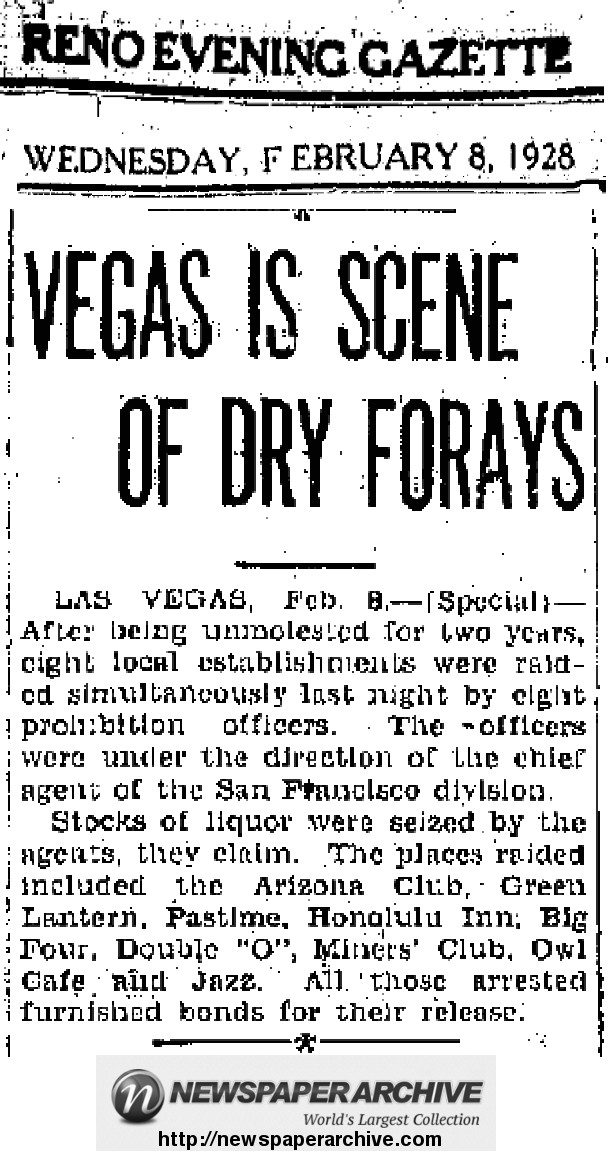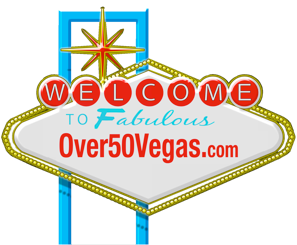- About Over50Vegas
- How did Las Vegas become Las Vegas?
- Observations by Charles "Pop" Squires- Las Vegas Pioneer and Publisher
- Books and References Sites
- Las Vegas Phonebook and City Directories of Bars, Casinos and Hospitality Properties
- Casino Collectible Shows & Local Meetings
- Visit the ChipGuide
- Visit the Museum of Gaming History
- Visit the Casino Chip & Gaming Token Collectors Club, Inc.
- Sitemap by name of property
- Sitemap by address of property
- Click here to request page update notifications
- Contact Over50Vegas
116-118 S. 1st Street
Las Vegas, NV
Big 4 Club & Bar
19
31-1940's
Prohibition, known informally as the Volstead Act, came into force at midnight on January 17, 1920.
It provided that "no person shall manufacture, sell, barter, transport, import, export, deliver, or furnish any intoxicating liquor except as authorized by this act."
This failed social experiment was repealed December 5, 1933.
This article points out that bars in Las Vegas were left unmolested for two years while liquor sales in the country were outlawed. Then eight establishments were raided simultaneously by eight prohibition officers.
The places raided included the
Arizona Club, Green Lantern,
Pastime, Honolulu Inn,
Big Four, Double "O",
Miners' Club, Owl Cafe,
and Jazz.
All those arrested
furnished bonds for their release.

The Big 4 Club opened in 1931 at 112-114 South First Street. Licensed for slots, 21 and craps the Big 4 closed in the 1940s. Four dice styles and six different colors of chips (all are non-denominated) have been found for the Big 4, as well as matchbooks. {From an article in the Casino Collectible News Magazine "As time Goes By-Pt.1"}
In the 1932-33 City Directory listing at 116 South First the names William L. Marsh, John D. Butler, Fred Sifford, prop. are listed with it but they have no telephone. It is listed at 116 South First in the 1934 Las Vegas City Directory.
There is no listing for the Big 4 in the 1930, 1931, 1939 Nevada Telephone Directory.


The reference to A T McCarter in the article to the left was for the Exchange Club.
A few weeks after the articicle above appeared limiting gambling
to existing establishments for the time being... a lawsuit was filed.
This is a transcription of an article that was in too poor a condition to be readable.
Nevada State Journal
May 28, 1931
A suit seeking to force the city of Las Vegas to issue a gambling license was heard today in the state Supreme Court.
The action was filed by Roy Grimes, D J McCauley, and R H Davenport, who seek to conduct a dice game in the Pavilion building at Lorenzi's Resort in Las Vgeas.
The three men declare the city officials of Las Vegas, by refusing them a permit, is guilty of discrimination under the state law.
Their application for the gambling license was filed with the city clerk April 7, (1931) and they assert that their application was in due form and that they possess the necessary qualifications prescribed by the laws of the state of Nevada and by the ordinances of the city for applicants for gaming licenses
The Las Vegas officials, in attempting to regulate gambling, March 30 (1931) passed an emergency ordinance with which became effective April 3. (1931) {Note: Gambling was legalized in Nevada on March 19, 1931}
Two days later and prior to the filing of petitioner's license, the city granted gambling licenses to the Boulder Club, Las Vegas Club, A. T. McCarter of the Exchange Club, and Stocker and Morgan at the Northern Club, and then adopted a resolution that no license would be granted in Las Vegas except of those places of business that had had gambling licenses during the previous quarter and that no further or new licenses would be considered until a zone Was established by them for the operation of gambling houses and the policy adopted by the board governing the issuances of new licenses.
April 17, (1931) the board rejected the application of Grimes, McCauley, and Davenport who thereupon applied to the Supreme Court for relief from what they class “unfair and unjust discrimination”.
The petitioners were represented before the Supreme Court by Charles Lee Horsey, while the action of the board of city commissioners of Las Vegas was upheld by F. A. Stephens, city attorney.
Negro Club Licensed
Several days later the board adopted a resolution fixing the policy of the board as contrary to the granting of further gambling licenses for the quarter save to those licensed during the previous three months but providing that members of the Ethiopian race might be granted licenses for the conduct of the game or games in a place catering exclusively to persons of the same race.
In the article below dated July 8, 1931 the applicants lost their battle for licensing at the Supreme Court of Nevada.



Over50Vegas.com by Over50Vegas.com is licensed under a Creative Commons Attribution-NonCommercial-NoDerivs 3.0 Unported License.
Based on a work at http://over50vegas.com/index.html.
This is a non-commercial, educational, hobby site. Images on this site are from our personal collection and from personal collections of fellow enthusiasts who have shared their scans with us. Other images are noted by source with links to the original. If you feel that any image used here has infringed upon fair use of an image you hold the copyright to, please contact us at the links above and it will be credited or removed at your request.
Sources you might want to visit for more information include:

Search for anything on this site. Click "Advanced" to narrow your search.
